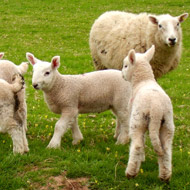Maternal ability assessment set to improve

"The maternal ability EBV provides producers with a way to assess this commercially important trait".
New research will lead to 'major improvements' in the assessment of maternal ability in sheep, according to beef and lamb levy body EBLEX.
Research commissioned by the organisation, looking at the Lleyn and Dorset breeds, identified the need for a better way to assess the genetic potential of flocks for maternal ability.
The updated approach is being rolled out to all breeds recorded by Signet Breeding Services in 2015. It takes into consideration the direct and maternal genetic influences on a lamb's eight-week weight, as well as environmental influences.
The analysis of eight-week weights will consider:
- The contemporary group in which lambs are reared – incorporating their flock and year of birth, as well as their sex
- The number of lambs being reared by each ewe
- Age of the ewe
- Direct genetic influence on lamb growth rate from sire and dam – this becomes the eight-week weight EBV
- Maternal genetic influence on lamb growth rate from dam – this becomes the maternal ability EBV
- Temporary environmental influences on the lamb
- Permanent environmental influences on the dam
The organisation say that the maternal ability EBV is designed to identify breeding lines where ewes express superior performance as mothers in terms of their ability to influence lamb growth rate in early life.
They add that it is expressed 'independently of prolificacy', however it will take into account that a number of lambs that a ewe is rearing. By taking this into consideration, the maternal ability of EBVs of ewes producing singles/multiples are not biased in any way.
EBLEX breeding specialist Sam Boon said: "Without access to detailed lamb weight records it is very difficult to assess a ewe's genetic merit for traits like milk production and maternal care, and virtually impossible when selecting rams.
"The maternal ability EBV provides producers with a way to assess this commercially important trait. This will help them avoid the purchase of rams whose daughters are likely to express poorer levels of milk production and rear lighter lambs as a result."



 FIVP has shared a survey, inviting those working in independent practice to share their views on the CMA's proposed remedies.
FIVP has shared a survey, inviting those working in independent practice to share their views on the CMA's proposed remedies.